
The government in the UK is undertaking an ambitious plan to transform the NHS from a service that treats sickness to a service that is focussed on prevention and a greater shift towards digital access.
This is being undertaken as part of the current government’s ‘10 Year Health Plan’. A key proposal as part of this plan is the dismantling of the national Healthwatch England and the 153 local Healthwatch organisations across England.
This is a concerning development for several reasons:
- The 10-Year Plan rightly emphasises empowering patients through digital technology, transparency, and choice, linking these initiatives to strengthened procedures for measuring patient satisfaction. However, this approach relies heavily on patients having access to apps and digital tools to provide feedback. Since its establishment in 2013, Healthwatch has been gathering and analysing this type of intelligence, particularly from individuals who lack digital access or who find it difficult to raise concerns without the support of an independent body operating outside the NHS.
- Healthwatch has played a pivotal role in shaping the 10-Year Plan by consulting with local communities and providing evidence-based recommendations on how health and social care services can be improved. Feedback collected by Healthwatch has directly influenced proposals relating to complaints reform, GP access, and enhancements to mental health services, among others. It seems counterintuitive that, after years of dedicated effort and substantial investment, Healthwatch now faces the prospect of undermining the very independence that has enabled it to drive these improvements.
- The 10-Year Plan sets out proposals for taking on Healthwatch responsibilities in-house, either directly within the NHS or via local councils. This would fundamentally impact on the statutory independent status of Healthwatch which is critical for representing the interests of patients free from any conflict of interest. If absorbed into the NHS, there would be a significant conflict of interest: the same bodies responsible for commissioning and delivering care would also be responsible for scrutinising themselves.
- Understandably, many local Healthwatch organisations across England, as well as Healthwatch England at the national level, have expressed concerns about the proposed changes and their potential impact on patient voice. They highlight that an “in-house” model risks softening critical feedback and diluting accountability. Healthwatch rightly cautions against sidelining independent scrutiny, which is essential for ensuring transparency, trust, and meaningful improvements in health and social care.
- Most local Healthwatch organisations have fostered strong, collaborative partnerships with local stakeholders, particularly independent advocacy providers. They play a critical role in signposting residents to advocacy services, providing additional support for those navigating complex health and social care systems. Without this vital link, some residents may be unaware of, or unable to access, these services, potentially exacerbating health inequalities, especially among marginalised and underrepresented communities.
Dismantling Healthwatch would likely reduce opportunities for thousands of people across England to influence the health and social care services they rely on. It could sever important links between marginalised communities and those responsible for decision-making. Healthwatch offers a distinctive channel for gathering community feedback and amplifying patient voices, one that cannot be replaced by the organisations delivering care themselves. Removing this independent body would eliminate a crucial safeguard, undermining accountability and the ability of services to respond effectively to the needs of the public.
Dave Bradshaw
Chief Executive Officer (Sandwell Advocacy)
We would love to hear your thoughts on the dismantling of Healthwatch and what this means to you, please contact us if you would like to share your feedback
